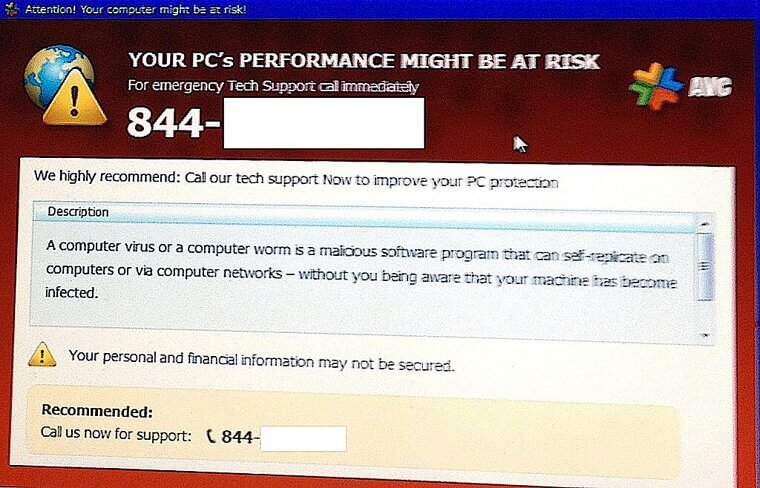Sweepstakes and Lottery Scams
Those “You’ve won!” messages are exciting, but almost always fake. To "claim" your winnings, you’ll be told that you must first pay taxes, processing fees, or customs duties. The important thing to remember is that actual sweepstakes will never ask you to pay up front.
Government Impersonation Scams
Scammers pose as representatives from the IRS, Social Security Administration, or Medicare, often calling or emailing with threats of legal action, fines, or loss of benefits. They also use caller ID spoofing to appear legitimate, pressuring victims into paying non-existent "debts" or revealing sensitive information.
The Grandparent Scam
This emotionally manipulative scheme usually involves a scammer posing as a grandchild in distress. They claim to be in an urgent situation, like being in jail, needing medical attention, or having been in an accident, and ask for immediate funds via wire transfer or gift cards.
Tech Support Scams
A pop-up message or unsolicited phone call alerts the user to a "security problem" with their computer from a company like Microsoft or Apple. The scammer will then convince the victim to provide them with remote access to their computer and/or to pay a hefty fee for "repairs" or "software" that are completely bogus.
You might want to check on that internet “friend” of yours…
You might want to check on that internet “friend” of yours…
Romance Scams
Your internet sweetheart might not be that sweet. Scammers will often create fake online profiles to build a trusting, emotional relationship with their victims. Once they have gained the victim's trust, they will invent a financial emergency and ask the victim for money.
Ponzi Schemes
Named after the famous swindler Charles Ponzi, this scam involves paying returns to early investors with the money taken from newer investors, rather than from any actual profits. The scammer will create the illusion of a successful, low-risk, high-return investment until the scheme collapses and leaves most investors with nothing.
Never share personal information under pressure!
Never share personal information under pressure!
"Phantom Hacker" Scams
The victim receives a call or email from a scammer posing as a banker or tech support agent. They then claim that the victim's account has been hacked and the only way to "secure" their money is to transfer it to a "safe" account, which is, in fact, controlled by the scammer.
Reverse Mortgage Scams
While reverse mortgages can be a legitimate financial tool, scammers often exploit them by offering fraudulent services. They may convince a homeowner to take out a reverse mortgage and then immediately steal the funds by promising home repairs or other services that are never performed.
Phishing Scams
These scams use emails or text messages that appear to be from a legitimate company (like a bank, Amazon, or a credit card company) to trick the recipient into clicking a malicious link. The link leads to a fake login page designed to steal the user’s personal and financial information.
Being asked to pay money for a job? Likely a scam…
Being asked to pay money for a job? Likely a scam…
Fake Jobs / Employment
You see an ad promising income from home, and you apply. Scammers will offer payment for simple online tasks like liking videos or rating products to build trust, and then eventually demand victims deposit their own money (often cryptocurrency) to unlock larger "earnings" that are never paid out.
Charity Scams
Scammers often create fake charities during a natural disaster or major event. They will appeal to a retiree’s sense of generosity and pressure them to donate money, which, of course, goes directly into the scammer’s pocket.
Medicare and Health Insurance Scams
Scammers, posing as Medicare representatives, call or visit with promises of free medical equipment, services, or genetic testing. They will then obtain the victim's Medicare number and other personal information and use it to file fraudulent claims and bill Medicare for services that were never provided.
Even in death, some scammers won’t give you peace...
Even in death, some scammers won’t give you peace...
High-Fee or Unsuitable Financial Products
Dishonest or inexperienced financial advisors may recommend complex financial products that earn the advisor a large commission but are a poor fit for a retiree's financial goals. These usually have high fees, long-term lock-up periods, and significant penalties for early withdrawal.
Home Repair Scams
These scams are often carried out by "contractors" who show up at a retiree's door unannounced. They will point out a supposed problem with the house and demand a large upfront payment for "repairs." Once paid, they will then either perform subpar, unnecessary work or take the money and disappear completely.














